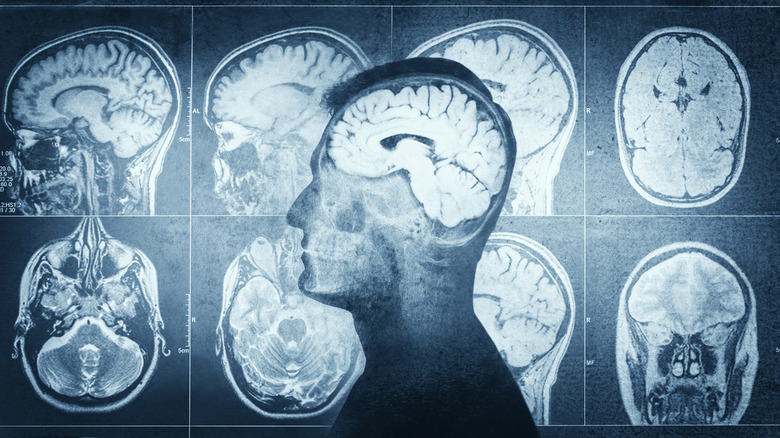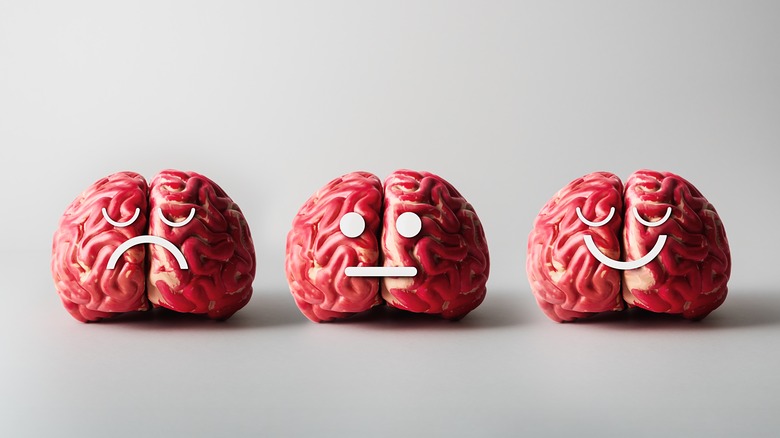Is There A Link Between Migraines And Epilepsy?
Understanding what epilepsy and migraines are is the first step to understanding the connection between the two conditions. Epilepsy is a brain disorder that causes recurring, unprovoked seizures (via the Epilepsy Foundation). A seizure is defined by the Mayo Clinic as a sudden electrical disturbance in the brain, causing an individual to lose control of their behavior, feelings, and movements. Having two or more seizures within 24 hours leads to an epilepsy diagnosis.
A migraine is a recurrent headache that can cause throbbing or pulsating pain on one side of the head, accompanied by nausea, vomiting, sensitivity to light, and vision changes (via the Cleveland Clinic). Cortical spreading depression (CSD) occurs in both epilepsy and migraine patients. According to a 2018 article published in Neurological Research, CSD is a wave of increased electrocortical activity and vasodilation, followed by sustained decreased activity and prolonged vasoconstriction. The Association of Migraine Disorders explains that epilepsy and migraines share other similarities. Both have a genetic component, and people with epilepsy are twice as likely to experience migraines. Numbness in the face or arm can be a symptom of both medical conditions, and each is frequently misdiagnosed and undertreated.
Additionally, epilepsy and migraines share similar triggers. Triggers are anything that make it more likely for someone to experience a seizure or migraine, or factors that indicate a seizure or migraine may be coming (via the Epilepsy Foundation). Per the Association of Migraine Disorders, the shared triggers include stress, disrupted sleep patterns, and alcohol consumption.
Differences between epilepsy and migraine disorders
Both epilepsy and migraine disorders can cause painful headaches. However, the symptoms associated with the headaches are often quite different. For example, the onset of headaches differs between seizures and migraines. Migraine-related pain intensifies slowly, whereas a seizure headache occurs without warning. Other symptoms that differ between the two are the duration of visual disturbances, which are shorter in seizures and more prolonged during a migraine episode. Additionally, when patients experience automatism, strange tastes or smells, or memory loss in association with a headache, they are usually seizure-related (via Everyday Health).
Another important difference between epilepsy and migraine disorders is their prevalence within the general population. Within the United States, it is documented that 1.2% of the population has been diagnosed with epilepsy (via Healthline). This means that 3.4 people within the United States are currently living with an epilepsy diagnosis, and one in 26 people will receive an epilepsy diagnosis in their lifetime. According to the American Migraine Foundation, migraines impact 12% of the population nationwide, and they are diagnosed in 17% of women and 6% of men. Numerically, this means that 39 million people are affected by migraines every year (via MedicalNewsToday). The biggest difference between the two disorders how prevalent it is within the general population.
Can migraines cause seizures?
Currently, research does not support a causal relationship between migraines and seizures, or that seizures cause migraines. According to Healthline, the two disorders are often comorbidities of each other. A 1996 study published in Neurology indicated that the risk of migraine was more than twice as high in patients with epilepsy than in those without, and this included all subtypes of epilepsy. Not only are people with epilepsy twice as likely to experience migraines, but migraine sufferers are more than twice as likely to get diagnosed with epilepsy (via WebMD).
It isn't clear what the scientific link between epilepsy and migraines is, but there are variables that may contribute to their co-occurrence. Migraines may trigger a seizure in a rare condition called migraine aura-triggered seizure, or migraine epilepsy. This occurs when a migraine is followed by a seizure in a short period of time. Other factors that may impact the connection between migraines and seizures include brain abnormalities caused by seizures. Visual symptoms of migraines may trigger a seizure, and shared genetic mutations may increase susceptibility to both disorders (via MedicalNewsToday). If patients experience both migraines and epilepsy, it's imperative their doctors monitor their symptoms closely in order to rule out migraines as seizure-related headaches, and vice versa. Changes in headache severity and duration in patients living with epilepsy and migraines should always be reported to a healthcare provider.



